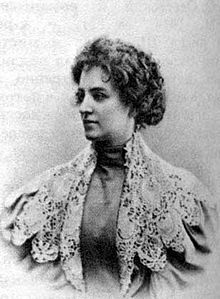Zinaida Gippius | |
|---|---|
 Gippius in the early 1910s | |
| Born | Zinaida Nikolayevna Gippius 20 November [O.S. 8 November] 1869 Belyov, Tula Governorate, Russian Empire |
| Died | 9 September 1945 (aged 75) Paris, Provisional Government of the French Republic |
| Occupation |
|
| Literary movement | Symbolism |
| Spouse | Dmitry Merezhkovsky |
Zinaida Nikolayevna Gippius or Hippius (Russian: Зинаи́да Никола́евна Ги́ппиус, IPA: [zʲɪnɐˈidə nʲɪkɐˈlajɪvnə ˈɡʲipʲɪus] ; 20 November [O.S. 8 November] 1869 – 9 September 1945) was a Russian poet, playwright, novelist, editor and religious thinker, one of the major figures in Russian symbolism.[1][2] The story of her marriage to Dmitry Merezhkovsky, which lasted 52 years, is described in her unfinished book Dmitry Merezhkovsky (Paris, 1951; Moscow, 1991).
She began writing at an early age, and by the time she met Dmitry Merezhkovsky in 1888, she was already a published poet. The two were married in 1889. Gippius published her first book of poetry, Collection of Poems. 1889–1903, in 1903, and her second collection, Collection of Poems. Book 2. 1903-1909, in 1910. After the 1905 Revolution, the Merezhkovskys became critics of Tsarism; they spent several years abroad during this time, including trips for treatment of health issues. They denounced the 1917 October Revolution, seeing it as a cultural disaster, and in 1919 emigrated to Poland.
After living in Poland they moved to France, and then to Italy, continuing to publish and take part in Russian émigré circles, though Gippius's harsh literary criticism made enemies. The tragedy of the exiled Russian writer was a major topic for Gippius in emigration, but she also continued to explore mystical and covertly sexual themes, publishing short stories, plays, novels, poetry, and memoirs. The death of Merezhkovsky in 1941 was a major blow to Gippius, who died a few years later in 1945.
- ^ Steve Shelokhonov. "Zinaida Gippius biography". www.imdb.com. Retrieved 2010-10-13.
- ^ "Zinaida Gippius". Dictionary of Literary Biography. Retrieved 2010-10-13.